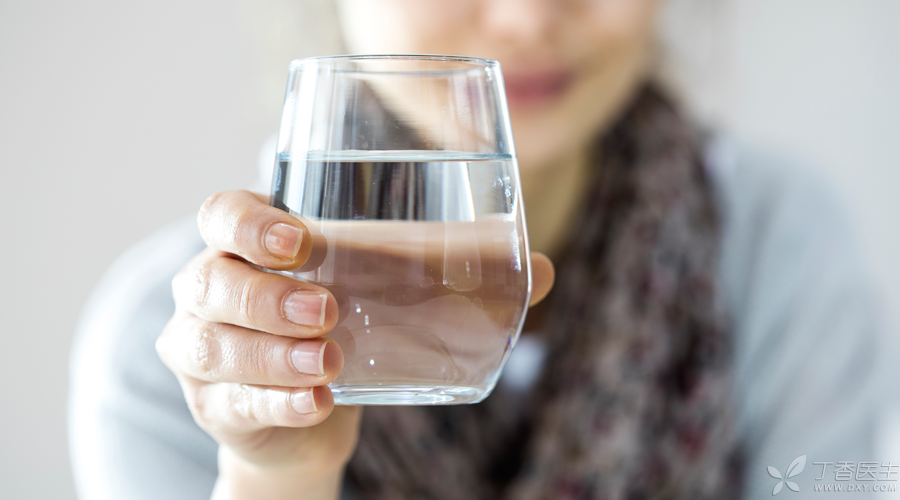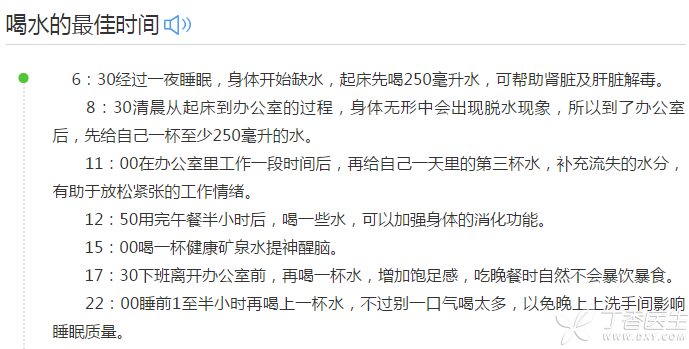
Drinking water is obviously a simple thing. Drink when you are thirsty, but it happened that some people would say [you have to drink like this to be healthier! ]
There are so many plays.
This is not true. There have been widespread rumors on the Internet about all kinds of [the best schedule for drinking water]. Dr. Clove finally couldn’t help but come and pick it up… … …
Is it good to drink water in what?
First, let’s take a look at the popular online [the best time to drink water]-

After counting and drinking according to this watch, I only drank 7 glasses of water a day. How is it different from the online saying [8 glasses of water a day]?
Perhaps rumors will also form cliques and then each will be king.
Is it really necessary to drink water regularly?
If you always forget to drink water, it is really a good choice to make a small plan for yourself and remind yourself to drink when the time comes.
But seriously speaking, there is really no need to be particularly rigid in drinking water. Drink more this time, drink less next time, leak once, drink more once, and wait until you are thirsty before drinking water… These will not have a great impact on your body in what.
Drinking water regularly is only an auxiliary means and is not necessarily healthier than waiting for thirst to drink again.
Is it necessary to pay attention to all kinds of drinking water?
1. Can’t drink water when eating, will dilute gastritis?
Not really.
Food itself has a lot of water, and gastric juice secretion is relatively flexible, so there will be no big changes just because you drink a few more saliva.
Studies have found that as long as it is not more than 2L of heavy drinking, it will not have a significant impact on the composition and pH value of gastric juice, let alone affect digestion.
If you have to say what what should pay attention to, it is not to drink too fast.
Drinking water in large quantities is easy to cause gas to enter the digestive tract, so there will be a real feeling of indigestion.
2. The first glass of water in the morning is very important, can detoxify?
The weight of the first glass of water in the morning does not matter, it depends entirely on whether you are thirsty or not after getting up or whether there is water at home.
First of all, the body is not so poisonous and need not be discharged.
Secondly, among various drinks such as honey water, light salt water, milk, soybean milk, fruit juice, coffee, tea and plain boiled water, plain boiled water is always the best choice.
The rest can be drunk, but I hope the reason why you drink it is because [I like it], not [it is healthier].
There is no such thing as [healthier].
3. Can a glass of water prevent heart disease before going to bed or getting up early?
Drinking water before going to bed or in the morning can reduce [blood viscosity], thus preventing the occurrence of coronary heart disease.
Lack of water or drinking water has little effect on blood, and blood viscosity will not change much.
Besides, the occurrence of coronary heart disease is mainly coronary atherosclerotic plaque rupture and thrombosis, which has nothing to do with blood viscosity.
In clinical studies, it is rarely found that drinking water in a specific period of time is helpful for disease recovery. Only in the prevention of kidney stones, some studies believe that drinking water before going to bed may be more valuable.
How much is enough?
The human body needs about 3000 ~ 4000 ml of water every day to maintain its physiological function.
This is a big quantity! Where can we drink so much water in one day?
Yes, we do not only rely on [drinking] to replenish water.
The human body produces about 300 ml of water every day, and the other half can be supplemented by [eating], while the remaining half is the only one that needs to be drunk.
If you have to say how much you drink is enough, then according to the requirements of the Dietary Guidelines of the Chinese Nutrition Society-
Men recommend more than 1700 ml of drinking water per day, while women recommend 1500 ml.
This is just a suggestion. Different situations have different demands for water.
For example, when it is hot in summer, the skin sweats more and loses more water, the amount that needs to be supplemented will increase accordingly.
For example, manual workers or people who stay outdoors certainly don’t have to stick to the recommended amount of drinking water. Naturally, they are thirsty fast and drink too much.
Another example is the sick people. Apart from a few cases such as chronic renal failure and heart failure, most sick people, especially those that cause fever, also need to drink more water. However, in cases such as kidney stones, gout and diabetes, drinking more water can even achieve the effect of prevention and treatment.
Drinking water is always a casual thing. When the body needs it, you just satisfy it.
